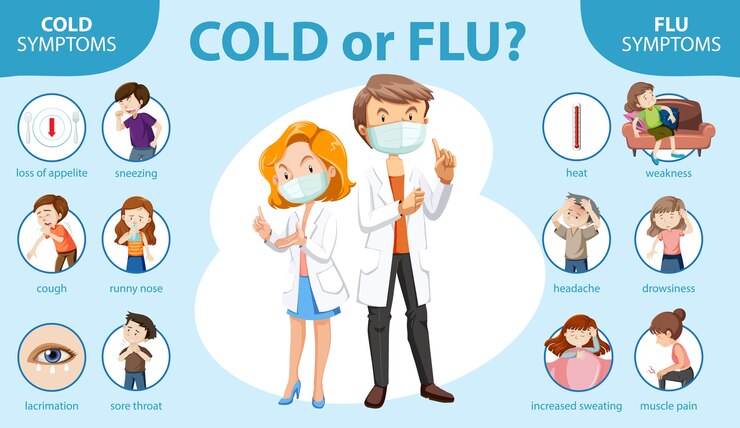Colds and flu are both sicknesses that affect your breathing, but they’re caused by different germs. Colds can happen because of lots of different germs, like rhinoviruses, parainfluenza, and certain coronaviruses. The flu, though, comes from influenza viruses. Flu symptoms are usually more serious than cold symptoms. They can hit you suddenly and make you feel sick, with things like a fever, cough, sore throat, body aches, headaches, and feeling tired.
Colds, on the other hand, are usually not as bad. They might give you a runny or stuffy nose, but they’re not as intense as the flu. Even though colds and flu have similar symptoms, the flu is usually worse and can cause serious problems like pneumonia or needing to go to the hospital. It can be hard to tell if you have a cold or the flu just by how you feel, but there are special tests that doctors can do to figure out if it’s the flu or not.
Take this quick assessment to learn the signs of flu and help you determine if you or your child has the flu or just a cold.
Cold And Flu Symptoms

Prevention Strategies
Preventing colds and flu is essential for staying healthy, especially during flu season. Here are some practical tips to minimize your risk of getting sick:
- Wash your hands frequently with soap and water, especially after being in public spaces or around sick individuals.
- Avoid close contact with people who are sick, and stay home from work or school if you’re feeling unwell.
- Cover your mouth and nose with a tissue or your elbow when sneezing or coughing to prevent the spread of germs.
- Get vaccinated against the flu every year to protect yourself and others from influenza viruses.
Management Strategies
| Strategies | Flu | Cold |
|---|---|---|
| Rest and Hydration | Rest aids recovery. | Rest helps recovery. |
| Symptom Management | Antivirals and OTC meds. | OTC meds relieve symptoms. |
| Medical Attention | Needed for severe cases. | Usually resolves on its own. |
| Isolation and Hygiene | Stay home; practice hygiene. | Stay home; practice hygiene. |
| Duration of Illness | Typically 1-2 weeks. | Usually 1-2 weeks. |
| Prevention | Annual flu shot recommended. | No specific vaccine; hygiene. |
